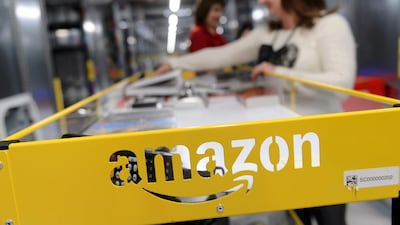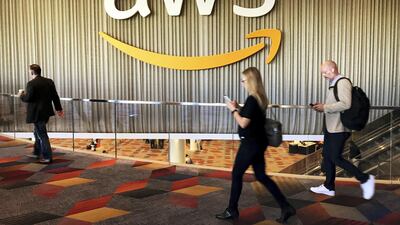The cashless revolution, which accelerated in the wake of the Covid-19 pandemic, and a new generation of consumers will shape the future of the retail industry, according to Amazon, the world's biggest e-commerce company.
While companies are perceived to be the drivers of disruption, Seattle-based Amazon believes when consumers' behaviour changes “in a meaningful way”, they become advocates for change, Paul Misener, Amazon's vice president for global innovation policy and communication, said in an interview with The National in Dubai.
The global retail industry has grown manifold, with consumer demand and behaviour influencing trends. Combined with increased competition and supply chain issues, these have set off a fierce market-share battle among retailers.
E-commerce, in particular, has benefited from this rapid rise. Global sales are expected to hit $6.39 trillion in 2024, up almost one third from 2021's projected $4.89tn and an almost 400 per cent surge from $1.33tn a decade ago, according to Statista data.
Amazon posted sales of over $386 billion in 2020, less than 1 per cent of this year's $4.28tn global total. But it is still the world's largest e-commerce company, with sales more than triple that of China's JD.com, the world's second-biggest online retailer.

Millennials — those born between 1981 and 1996 — have played a major role in the global trend. This is the generation with the most digital buyers, with 85.9 per cent making purchases online, according to content platform Power Reviews.
Millennial shoppers also depend on ratings and reviews to make informed purchase decisions, with 99.9 per cent reading reviews when shopping online and 63 per cent doing so when buying in-store, it added.
“In the early days it was novel to put your card information online. It was even a big deal in the countries that adopted the internet early,” Mr Misener said.
“This is a generational thing; today, young people entering the ranks of consumers are very comfortable with cashless payments, and it's not an impediment any more for the industry to grow because young people are encouraging others.”
Meanwhile, Generation Z — those born between 1997 and 2021 — have a spending power estimated at $323bn, business application platform CGS said in a recent report. While 67 per cent of older generations rely on sites such as Amazon, only 37 per cent of Gen Z shopped on the platform, CGS added.
Gen Z is also spending more on sustainable shopping destinations, with around 15 per cent using second-hand sites such as eBay or ThredUp for non-essential items, compared with just 3 per cent of Baby Boomers. Depop, a UK-based reselling site, is another indicator of Gen Z’s preferences: 90 per cent of its users are under the age of 26, CGS said.
Loyalty programmes, such as discounts on future purchases, are also high on Gen Z's list and are more important than fast delivery times, company philosophy and even quality of products.
“It's hard to say which among being all online, all offline or hybrid is the best, because it can matter a lot for the kinds of goods you're selling. The real challenge is that customers have so much choice now that everybody has to keep up,” Mr Misener said.
Acquisitions to fit in
While Amazon has been involved in more than 100 mergers and acquisitions since 1998, Mr Misener said it is a relatively low number as Amazon looks more at how an integration of another company would fit into its strategy. Its biggest transaction was acquiring Whole Foods for $13.7bn in 2017.
“We're not overdoing on acquisitions. The reality is that we've grown so much as a company within. If an acquisition makes sense we'll do that, but it also has to fit in the company to become part of us,” he added.
Amazon has also branched out into other sectors, including its Prime Video streaming service that rivals Netflix and its Luna gaming platform to challenge Microsoft and Google. At the recent Fantom Developer Conference in Abu Dhabi, its Amazon Web Services unit said it will help get the first one billion users into the blockchain industry, creating opportunities to build products and services on secure platforms.
“The future of retail is meeting consumer demand not only for a great selection of products and services available but also for a greater quality of delivery. Consumers are going to be increasingly picky about how they shop and level of service they expect,” Mr Misener said.
vice president for global innovation policy and communication at Amazon
As with many other companies around the world, Covid-19 caught Amazon off guard and it spent around $800 million on Covid-related safety measures in the first couple of months when the pandemic was taking hold, Mr Misener said.
“It taught us to innovate the same way we had to innovate all the time, but we weren't prepared for it just like everyone else. We found ourselves in a place where we had to act very fast to protect not only our employees but also our customers. We've been perfecting safety for over 20 years, but not for a virus,” he added.
Amazon, founded in a garage by Jeff Bezos in 1994, started off by selling books online. Mr Misener — an engineer, scientist and attorney — was hired in 1999 by Mr Bezos, currently the world's second-wealthiest person. He stepped down as chief executive in July to focus on his other ventures and was succeeded by Andy Jessy, but remains as Amazon's executive chairman.
In October, the company reported a drop in profit, which it expects will continue through the holiday quarter, blaming heavy spending to maintain delivery operations.









